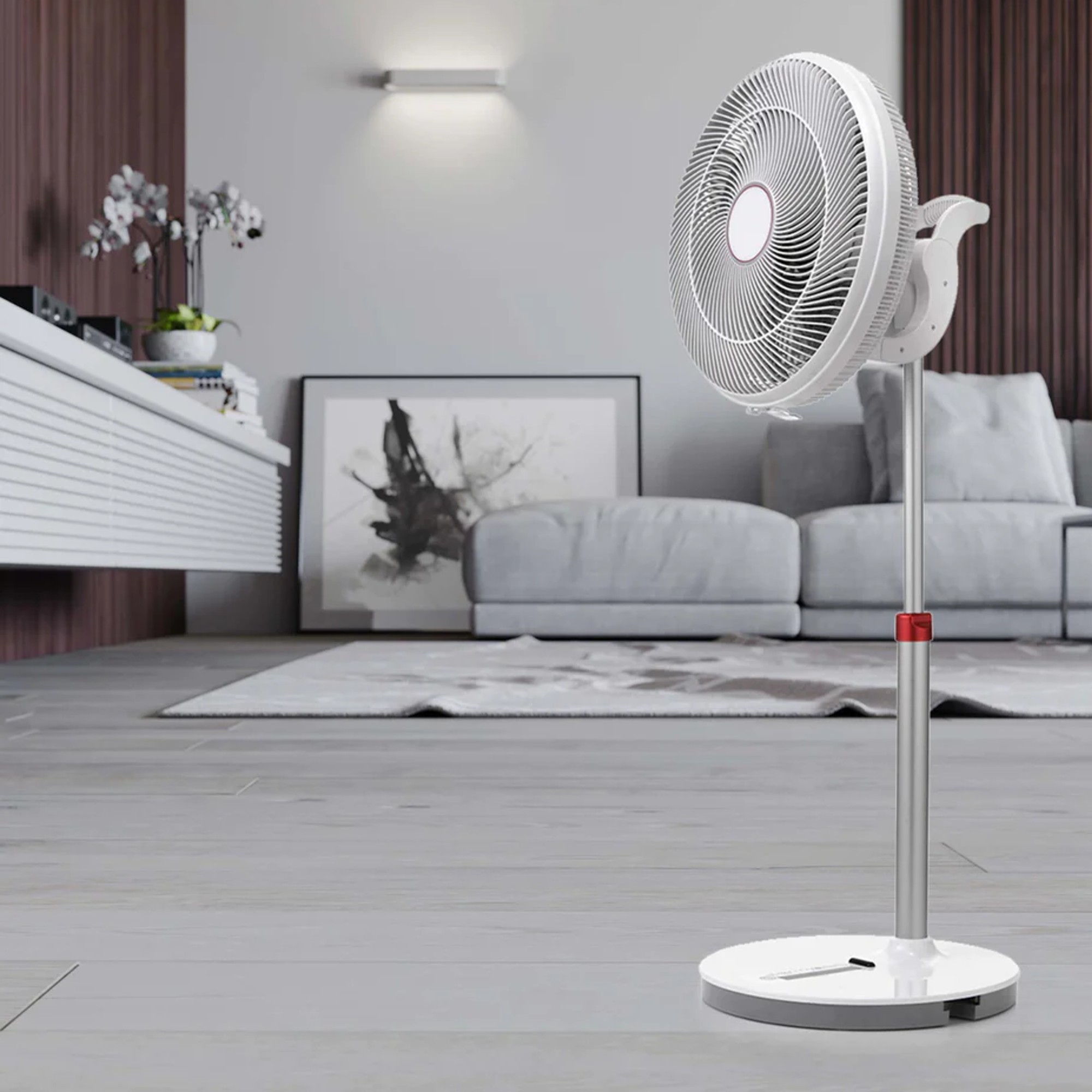
1. Specifications
2. Ease of use
3. Cooling powers
4. Noise levels
5. Extra functions
6. Verdict
EcoAir specialises in air treatment products, with a range of fans, portable air conditioners, dehumidifiers, and air purifiers in its product range.
The EcoAir Kinetic Fan is the brand's bestselling air circulator, offering a height-adjustable pedestal design that, thanks to its DC motor, claims to be 'super energy efficient', 'ultra quiet', and to deliver 'superbly high performance'. It's also the most energy-efficient fan I've come across, using just 1 to 18 watts per hour depending on which fan speed you choose – far less than the usual 40W+ power consumption of most non-DC fans.
This EcoAir Kinetic Fan review aims to put the brand's claims to the test. I've reviewed multiple bestselling fans to find the best-in-class, comparing assembly and set-up, ease of use, cooling powers, noise levels, and any extra functionality the fan offers.
Can the EcoAir Kinetic Fan hold its own compared to some of the best fans on the market? Read on to find out.
EcoAir Kinetic Fan review
Specifications
- Dimensions: H80.9-110 x W41.5 x D39cm
- Air displacement: 150 - 3264 m³/hour
- Noise: 11.1dB - 46dB
- Speed settings: 9
- Oscillation: 90° horizontal swing (90° manual vertical tilt)
- Other functions: timer, 'natural wind' mode, 'sleep' mode
- Remote control: yes
- Power: 1 - 18W
- Weight: 5kg
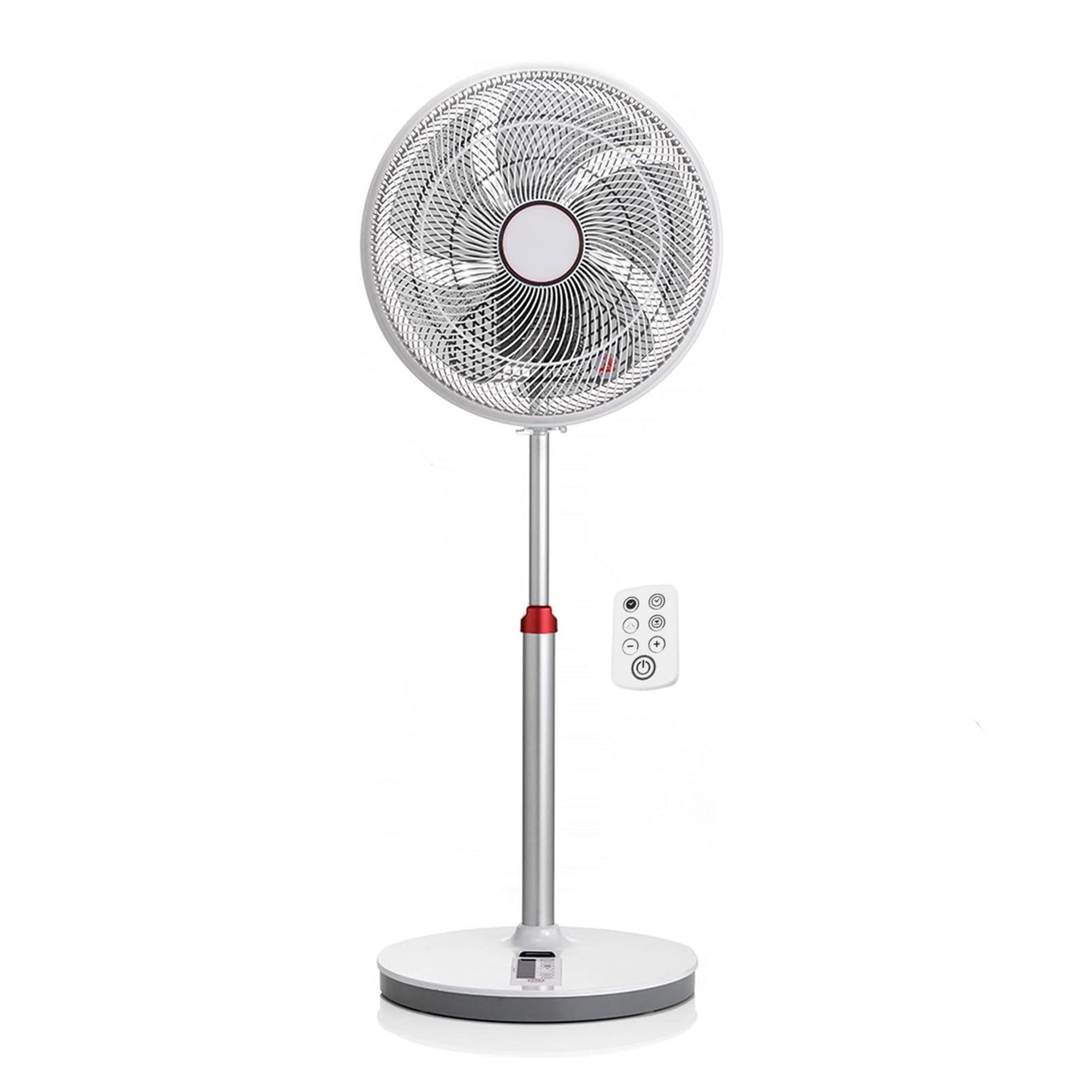
How we tested the EcoAir Kinetic Fan
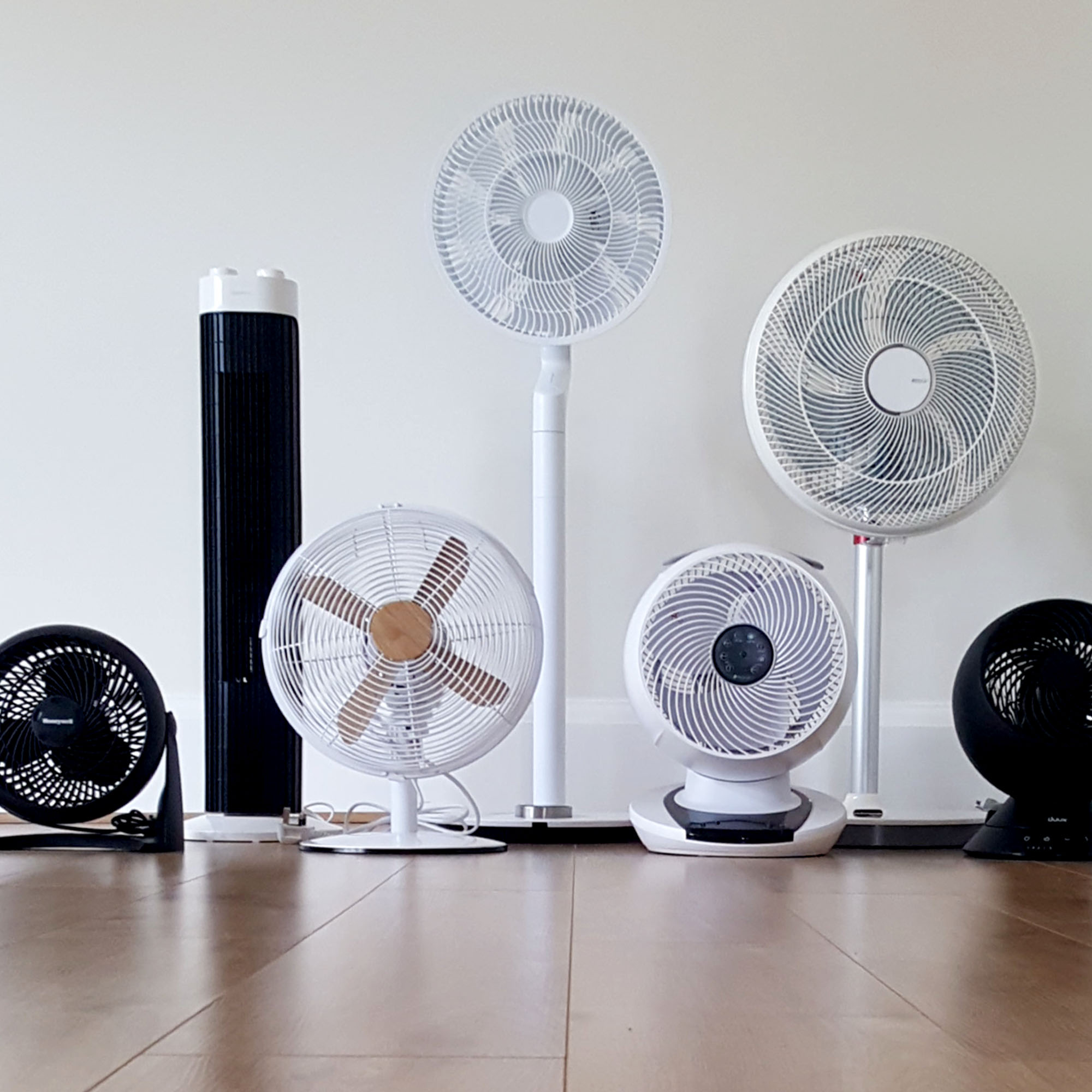
EcoAir Kinetic Fan review: unboxing
The EcoAir Kinetic Fan arrived in one of the largest packaging boxes of all the fans I've reviewed (H70 x W41 x D41cm) and is one of the heaviest fans I've tested, with the box weighing in at 7.2kg gross weight, and the fan itself accounting for 5kg of that weight.
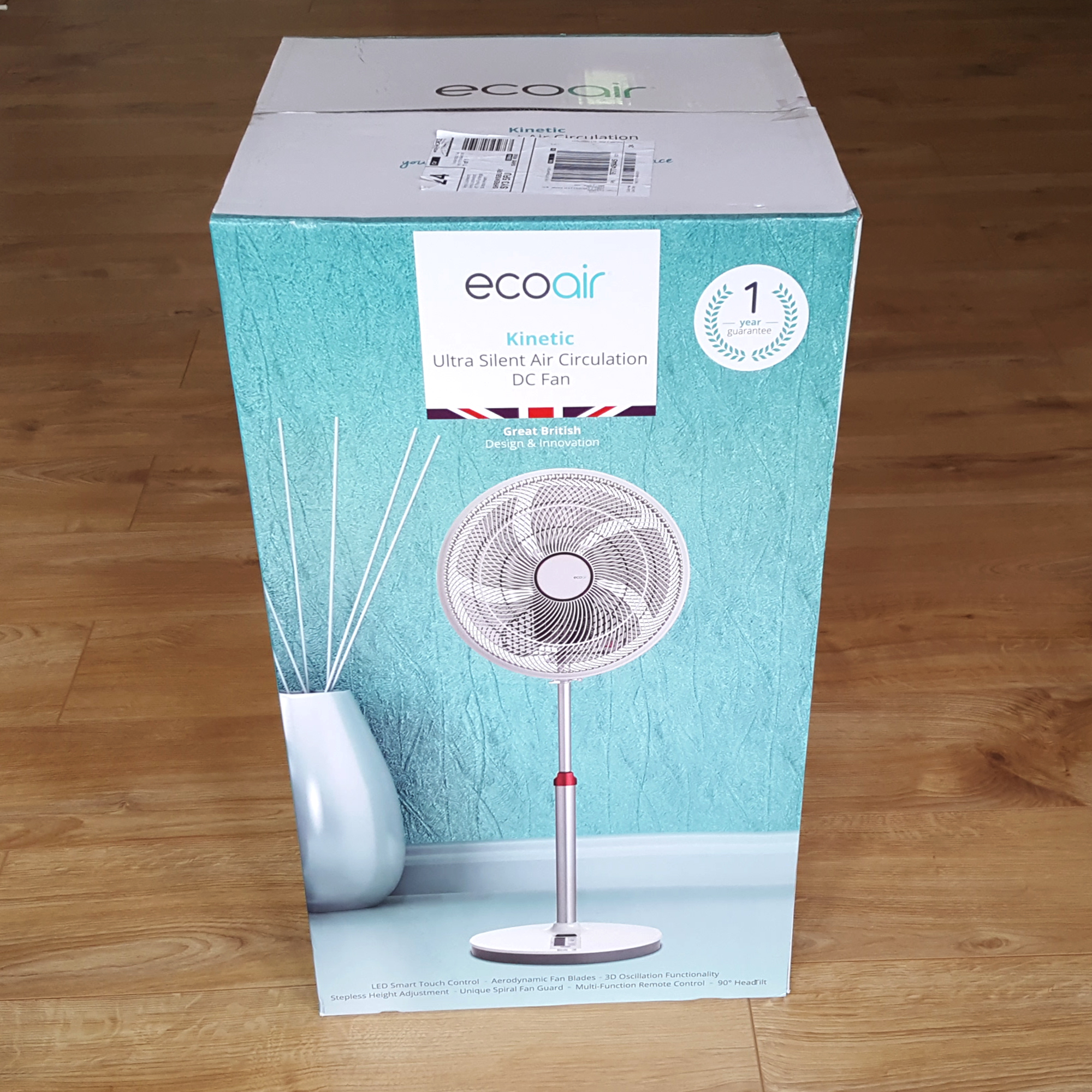
On unboxing, I was really pleased to see that the EcoAir Kinetic Fan didn’t look like it was going to require that much assembly. There were two packages inside the main box, one with the fairly weighty stand and motor, and a second package containing the two fan guards and fan blade, plus a small remote control.
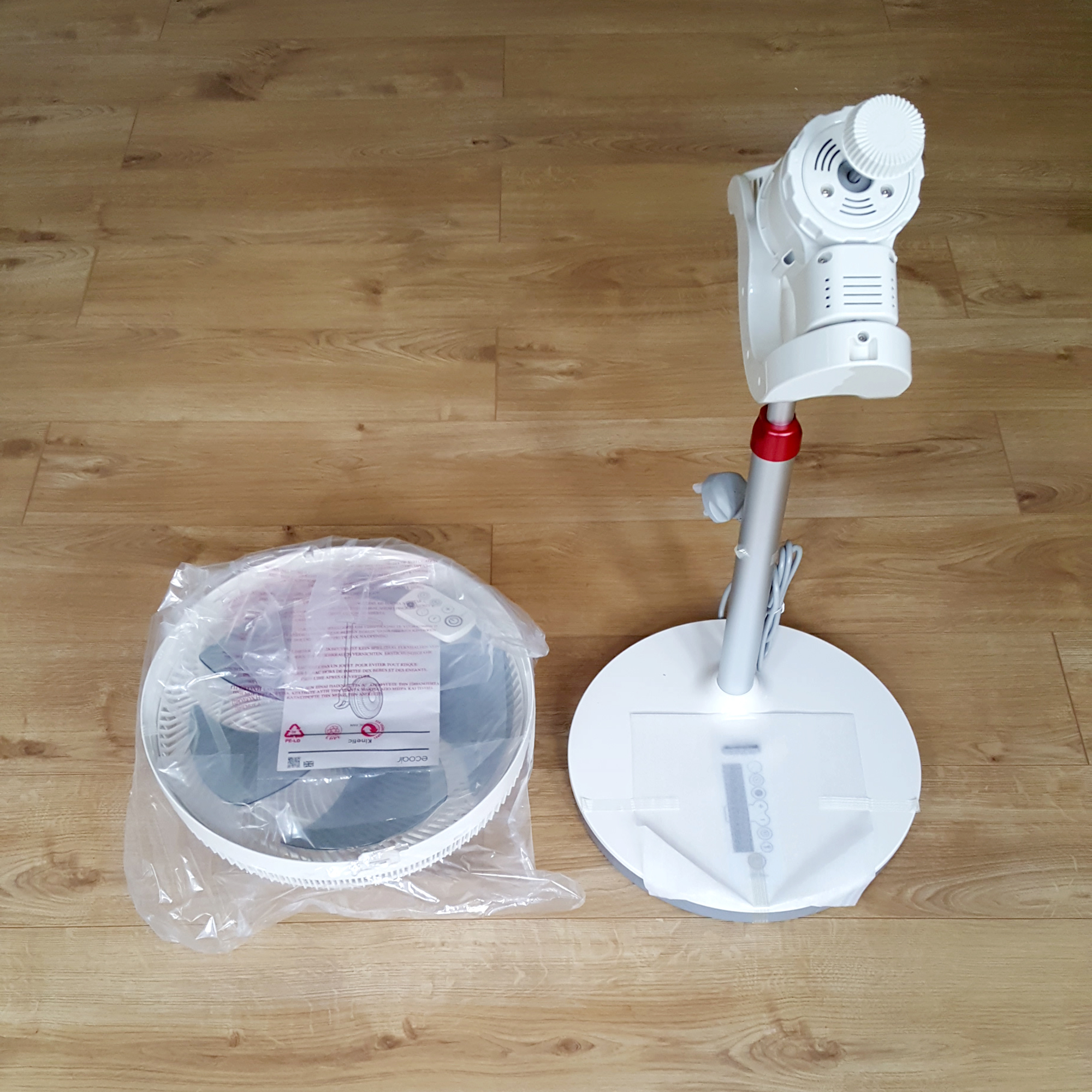
EcoAir Kinetic Fan review: assembly
After unpacking all the components, the first job was to separate the two grill guards and then unscrew the locking nut that comes pre-screwed onto the fan motor body.
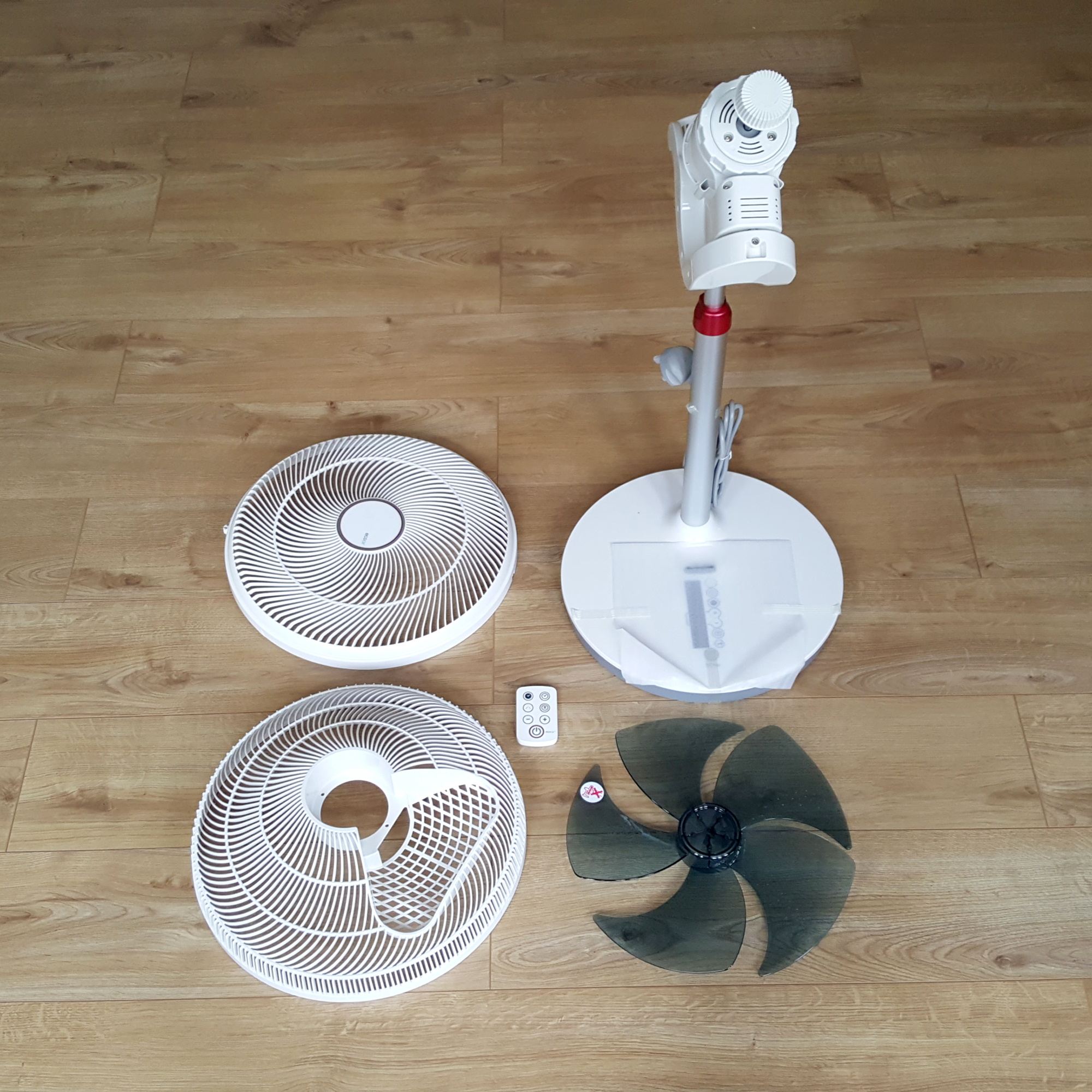
I then located the back grill guard onto the motor body and rethread the locking nut tightly to hold it in position.
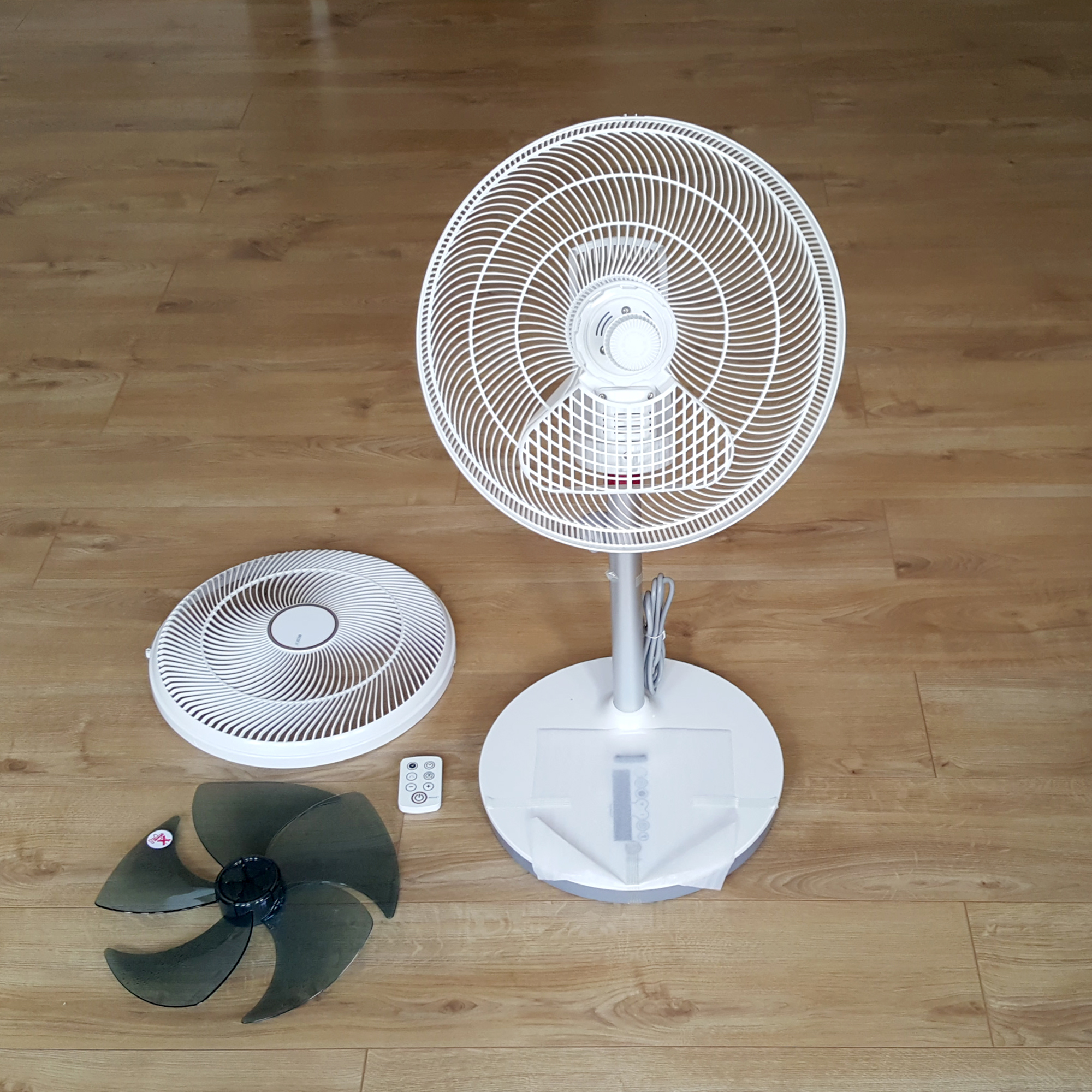
Next up it’s unscrewing the cap at the end of the motor shaft, inserting the fan blade onto the motor shaft, and securing the fan blade by screwing the cap back into place.
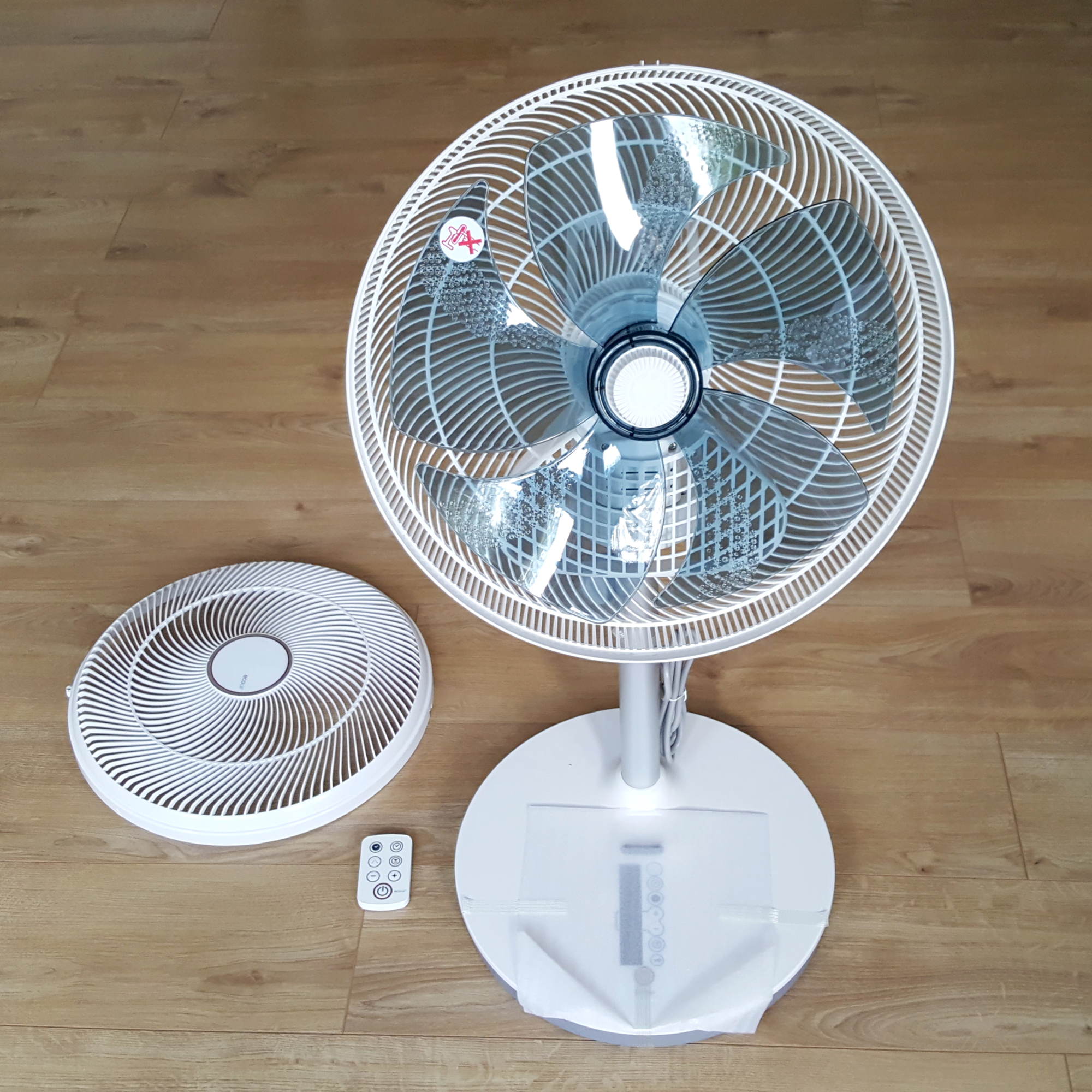
Then all that's left to do is slot the front grill guard into the latches on the back guard, and secure it with the locking buckle at the base (make sure to open this lock before fitting the front grill to save a little fiddling afterward).
The remote control comes with a battery included, so you just need to remove the insulation film before use.
All in all, assembly was super simple and took around 10 minutes. The assembly instructions are clear, and all components are large and easy to handle, with no extra tools required.
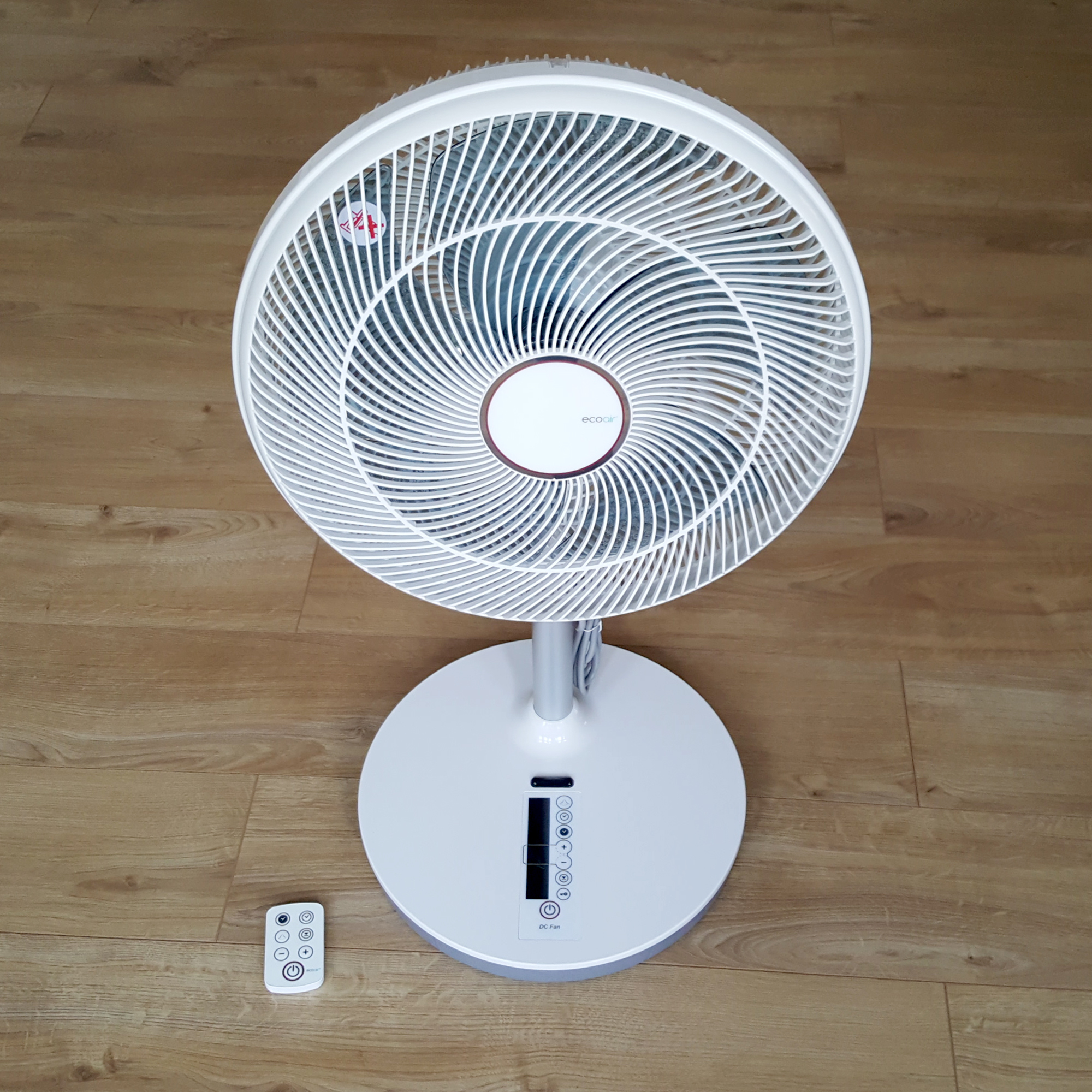
EcoAir Kinetic Fan review: design
My first impressions of the EcoAir Kinetic Fan were that it's large, and its design feels a little dated. However, its build quality looked and felt good.
Its 41cm diameter fan head is the largest of all the fans I've tested, and the 31cm diameter base takes up quite a bit of floor space, so this probably isn't going to be the best fan for a small home.
Due to its size and weight, the EcoAir Kinetic Fan also isn't that portable. Although it's perfectly possible to move it around the house, it feels a little unwieldy and requires a bit of heft to reposition compared to the other fans I've tested.
The cumbersome build also means that storing the fan when it's not in use could be a bit of an issue. Unlike the compact MeacoFan 1056 Air Circulator, this tall pedestal fan isn't going to fit neatly into a cupboard or wardrobe over winter.
Compared to similarly priced fans from brands like Meaco, Duux, and Boneco, the EcoAir Kinetic Fan perhaps also misses a few tricks on the style front. It's the most traditional looking of all the fans I've tested, and compared to its rivals' matt white and sleek black finishes, its gloss cream appearance feels a tad dated. This looks far more like a fan you'd find in an office, rather than an appliance that's been designed to appeal to the stylish homeowner. (You'll be wanting to read our Dyson Hot+Cool Formaldehyde HP09 air purifier review if looks are the most important criterion in your fan purchase).
That said, the EcoAir Kinetic Fan's build quality feels solid and robust, with all components feeling like they're built to last compared to many flimsier, more plasticky models. And its gloss finish – albeit not particularly on-trend – is practical, allowing for easy cleaning.
And, whilst I wasn't a huge fan of the visual appearance of the Kinetic's manual tilt lever at the rear of the fan, there's no denying it feels robust and very ergonomic to use, easily tilting the fan head up and down despite its weight.
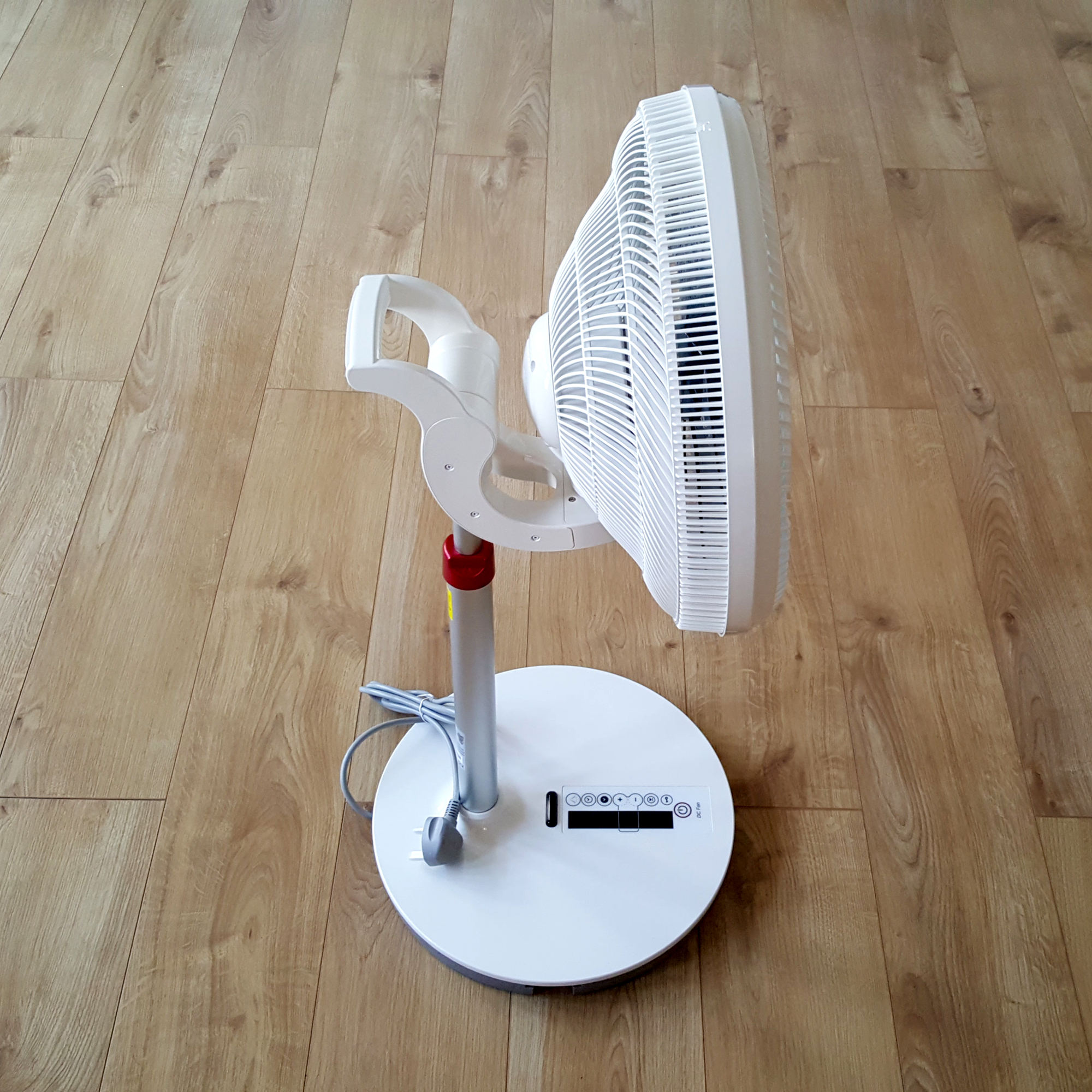
EcoAir Kinetic Fan: performance
My first impressions were that the EcoAir Kinetic Fan seemed like a fan built for practicality, so I was eager to power it up and see how it performed, a process made easy thanks to a very clear instructional manual.
Ease of use
The EcoAir Kinetic Fan can be operated either via the touch controls on the base of the pedestal, or by using the small remote control which comes included.
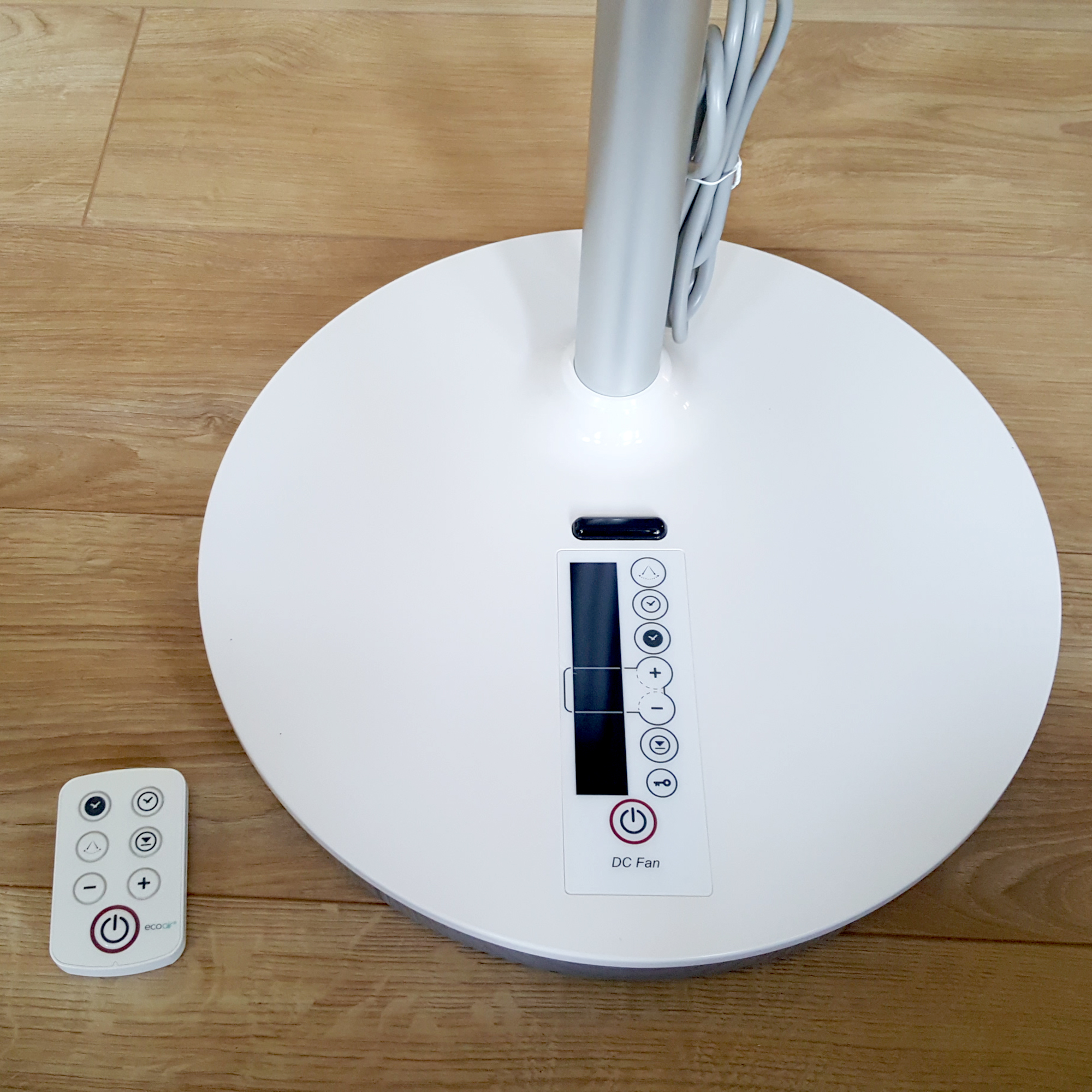
Both offer relatively large, easy-to-press buttons with clear symbols that are very easy to read. The digital display on the base of the unit lets you know which mode and setting is currently activated and comes with a handy child-lock function that prevents any buttons on the base from being pressed when it's engaged.
Once you've turned the fan on via the intuitively placed power button, there are three fan modes to explore.
'Normal' mode offers nine-speed settings. 'Natural' mode offers four-speed settings, all of which automatically vary the power output to simulate the feel of a natural breeze. And lastly, 'Sleep' mode decreases the fan speed down one setting every 0.5 hours until the lowest speed is reached.
Once you've chosen your preferred mode you can toggle the fan speed up and down via the simple + and - buttons. There is also a timer function that allows you to program when the fan turns on, and when it will turn off within 1-9 hours. And, lastly, there's the swing setting that allows the fan head to swing from left-to-right through 90°.
Overall, the EcoAir Kinetic Fan is very easy to use. It offers a good range of functionality without overwhelming you with more options than are necessary.
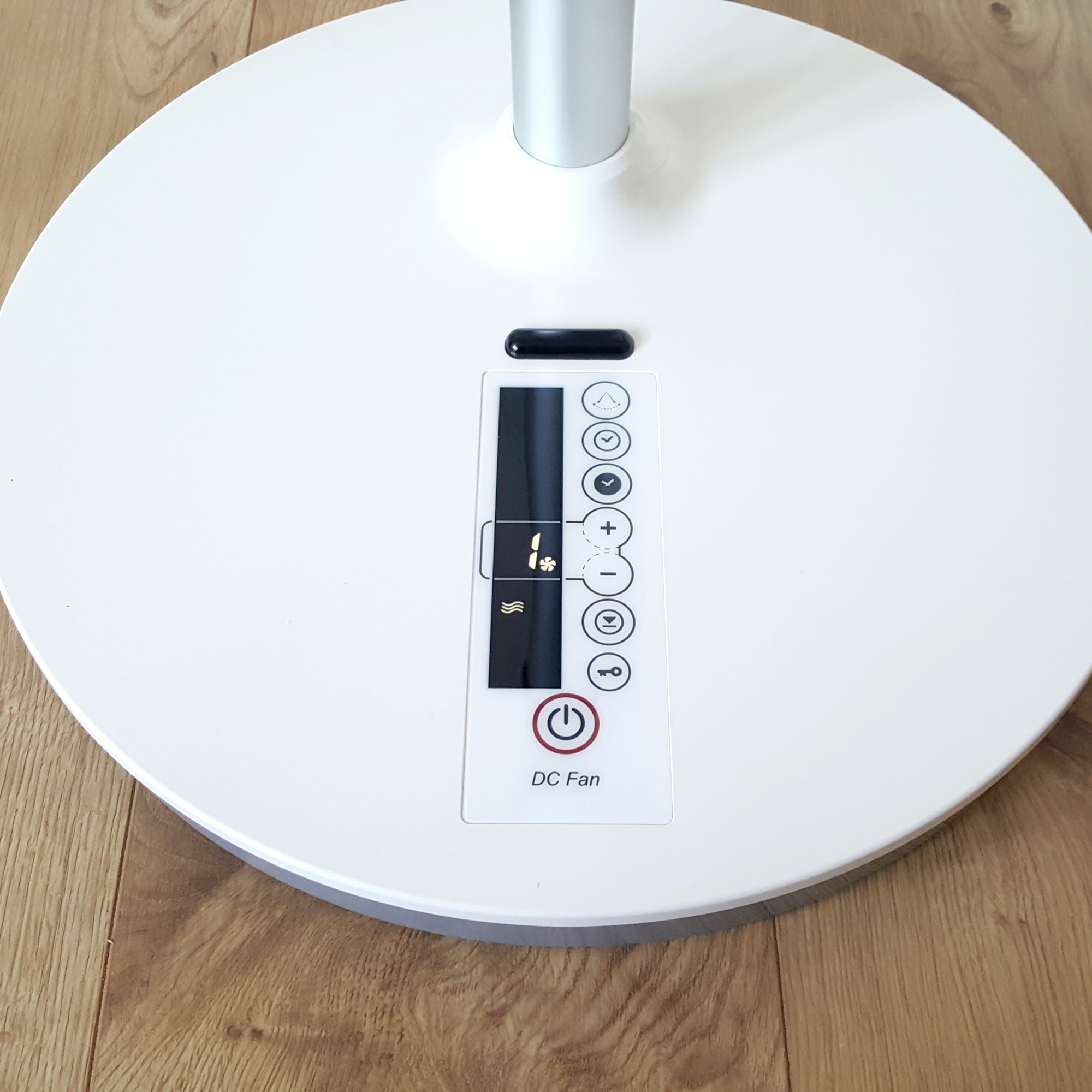
Cooling powers
Although I found the EcoAir Kinetic Fan's 41cm diameter a little obtrusive in my small home office, when it comes to cooling, those wide fan blades are a definite plus point.
On its highest settings, EcoAir says the Kinetic Fan offers air displacement of up to 3264 m³/hour. Impressive figures compared with the MeacoFan 1056 Air Circulator which delivers air displacement of 1056m³/ hour, and the Duux Whisper Flex Ultimate Fan which can circulate 820 m3 of air per hour.
Ironically, when I tested the two fans side by side, I found the MeacoFan 1056 Air Circulator felt the most powerful, despite its lower rate of air displacement. I put this down to the fact that the MeacoFan 1056 Air Circulator's smaller diameter means that when you're sat directly in front of the fan then its powerful air current is focused very tightly upon you. On the flip side, the EcoAir's wider fan blades mean a bigger area of airflow. This can be particularly useful if you want more than one person to benefit from the breeze, and can be enhanced by turning on the 'Swing' function that allows the EcoAirt Kinetic's fan head to oscillate left-to-right.
As a result, if I wanted a powerful yet compact fan predominantly for one person, I'd opt for the MeacoFan 1056 Air Circulator. However, if I wanted a powerful fan that could cool a larger room with multiple people in it, the EcoAir potentially handles bigger spaces better.
Most importantly, the EcoAir Kinetic Fan's powerful DC motor means the airflow really does have a cooling effect on a hot day, helping to evaporate moisture from the skin and cool down body temperature.
Noise levels
Thanks to its DC motor, the EcoAir Kinetic Fan is one of the quietest fans I've tested. The quietest according to its decibel ratings which the manufacturer measures as just 11.1dB on the fan's lowest speed setting and 46dB on its highest speed setting.
I definitely found it extremely quiet on speed settings 1-7 and still fairly quiet on its most powerful speed settings of 8 and 9. However, in my opinion, the EcoAir Kinetic wasn't quite as whisper-quiet as the quietest fan I've tested – that accolade still goes to the Duux Whisper Flex Ultimate Fan.
Despite the Duux Whisper measuring between 13-50dB – that's 2dB higher than the EcoAir Kinetic's lowest noise levels – to my ears, the Duux model is virtually silent other than the sound of gushing air. In contrast, despite the EcoAir's low volume, I could hear a low mechanical humming noise alongside the sound of airflow. I also found the EcoAir Kinetic Fan's noise increased a little more when the swing mode was activated, whereby you could hear a change in the motor noise as the fan reaches the farthest arc of each oscillation.
However, both fans are extremely quiet compared to most on the market. Which one you find the most unobtrusive probably comes down to individual preference on the type of noise you find easiest to block out from your awareness. Personally, I prefer the more natural-sounding Duux model that's akin to the noise of wind blowing outdoors rather than the low mechanical tone of the EcoAir Kinetic, but considering how much air the EcoAir Kinetic Fan can shift, it's hard to begrudge it a tiny bit of volume in doing so.
Extra functions
So far I was very impressed by the EcoAir Kinetic Fan's simple controls, quiet operation, and cooling powers, but there's a little more still to explore in its functionality.
As well as its 9-speed settings and left-right oscillation, there’s also a manual tilt function that allows you to adjust the up-down angle of the airflow. Most fans of a similar price point offer automatic up-down and multidirectional oscillation, so it feels a little strange to have to control this aspect manually, but it does make for very simple fine-tuning of the fan's vertical direction – there's no faffing around trying to press a digital control at just the right moment to stop the automatic oscillation in just the right place to hit the angle you want.
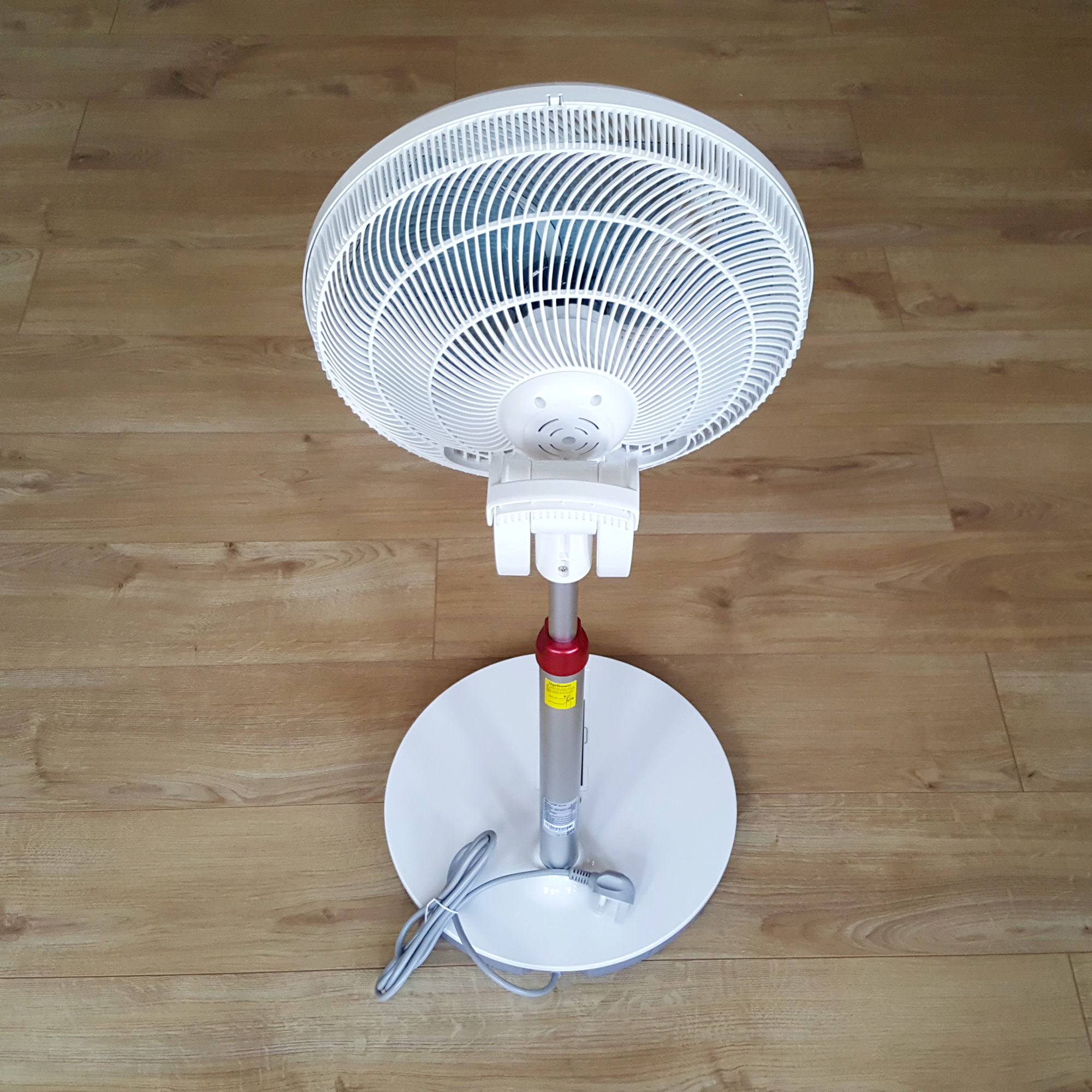
There's also a timer function that allows you either to set when the fan turns on, or when it turns off. You can set this in one-hour intervals, for anywhere between 1 and 9 hours. This is especially useful if you want to have the fan running whilst you fall asleep on a hot night, but don't want it using energy all night long whilst you're fast asleep.
But, my favourite feature by far is the addition of a ‘Natural' mode. As an alternative to 'Normal' mode which delivers consistent airflow, ‘Natural' mode delivers a much more natural feeling breeze thanks to the automatic variation of the airflow. If you’re sat directly in front of the fan then this 'natural breeze' feels much more pleasant on the skin than a steady flow of air.
The EcoAir Kinetic Fan is one of only two fans I've tested to offer this functionality, the other being the Duux Whisper Flex Ultimate Fan which is significantly more expensive. Despite the fact it means paying more than you would for a standard fan, this 'natural wind' feature is now a must for me after testing multiple models.
Verdict
Overall, the EcoAir Kinetic Fan is a robust and well-built fan that offers powerful performance, relatively simple assembly, straightforward and easy-to-use controls, quiet operation, and best-in-class energy efficiency.
Although its DC motor means a more expensive initial outlay, as a result, the EcoAir Kinetic uses just 1-18 watts of energy to run, making this the most affordable fan we've tested in terms of running costs. On its lowest speed setting that means it costs less than 1p per hour to run at current energy prices. (The Ideal Home article How much does it cost to run a fan? has the lowdown on calculating running costs). Impressive stuff compared to far less powerful non-DC fans that tend to use around 40W on average.
Its downsides are its large build which could make it a struggle to find space for in a small home, its lack of portability and the storage space it requires as a result, and its slightly dated appearance.
Looks and size-wise, in my opinion, the EcoAir fan is potentially more suited to an office environment than for home use. In fact, thanks to its quiet operation, this is the fan you would dream of your boss investing in to keep staff cool without the dreaded hum of umpteen fans all operating at once.
But, if you have a large room or open-plan space, and don't mind a fan that prioritises powerful performance and ease of use over style, then the EcoAir Kinetic Fan is a solid performer that will prove itself a real boon to own in a heatwave.
It's one of the simplest fans to operate at its level of performance, and – when temperatures rise and patience gets frayed as a result – that simplicity could well be worth its weight in gold.







